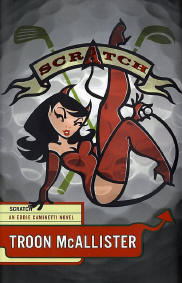Newest Eddie Caminetti novel up to standards of its predecessors
June 6, 2003
In an earlier column this year I used that old line about how golf companies don’t actually sell equipment–they sell hope.
In Scratch, the great new addition to the Eddie Caminetti series, Troon McAllister takes that joke and runs with it. He shows how a remarkable amount of hype takes advantage of the nearly childlike hopes of millions of golfers (Rugged Land; $23.95 SRP).
Caminetti himself is an otherworldly hustler, as shown in the very funny first two books about him (The Green and The Foursome). Therefore, it was probably only a matter of time before Caminetti turned his attention to the business side of golf.
This time Caminetti has some help. A CalTech physicist named Norman Standish is a recognized genius, but he knows his work is primarily based on finding flaws in others’ theories. He’s a bit depressed about it, and one of his buddies decides to cheer him up by making Standish part of a foursome for a round of golf.
It’s a Eureka moment.
The two men meet, and Standish is just persistent enough to break through Caminetti’s suspicious nature. The two men then combine their considerable talents to take on the golf ball industry, especially the folks at Medalist, the 800-pound gorilla of golf ball market share.
It’s not a fair fight.
Caminetti and Standish use a form of marketing jujitsu to create an incredible response to their new Scratch golf ball. Unlike Medalist, they don’t spend a dime buying endorsements from touring pros, or flooding golf magazines and television with advertisements.
Instead, they use two basic techniques.
First, a single golf pro begins using their ball, and startles everyone with his meteoric rise in the standings. It’s Fat Albert Auberlain, Caminetti’s caddie during the Ryder Cup, in one of the nicely done plot carryovers from The Green.
Second, they price a dozen Scratch golf balls at an even $100, twice what Medalist charges for its premium ball line.
That’s about it. Boom goes the market.
After all, if the Scratch balls cost that much, they must be really good. And besides, look at how Auberlain is playing.
The stunning success of this new competitor drives the people at Medalist nuts. They try several schemes, but nothing seems to work. Every move they make is countered by more jujitsu from Caminetti and Standish. Finally, the company president makes a fatal move. He sues the Scratch Company.
Caminetti is nothing if not confident, and so he decides to represent himself.
The trial itself is hilarious, at least from my perspective as an attorney. There’s just no way it could ever be conducted the way McAllister portrays it, but that doesn’t matter. It’s a satire, after all, and I’m not looking for slavish adherence to federal court procedure.
One unlikely but comical courtroom event follows another, and the action then shifts to a round of golf at Augusta National. The company president thinks his long-time membership gives him an advantage. Somehow he forgets that Caminetti suggested the round as a way to settle the case, and what that means.
That was a mistake, of course.
Once again McAllister shows how well he can describe a round of golf in which way too much thinking goes on.
One of the running subplots in the book also bears mention. At several places the conversation turns to why golfers love their game with such intensity. A wide range of theories are suggested and dismissed as incomplete. As the book comes to a close, Caminetti finally offers up his own theory. It touches upon man’s characteristic search for signs of hope where he can, in a far broader context than the business of selling sporting goods.
Caminetti’s insight is well worth considering and adopting. It also shows that once again McAllister accomplished a primary goal of any good satire.


